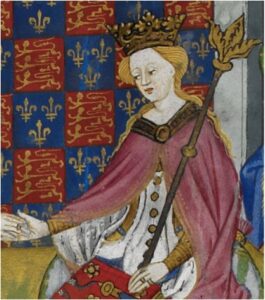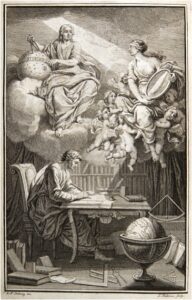‘My main goal, after all, is not political and military history, it’s history of the arts, of commerce, of governance, in a word, of human spirit’
(Mon grand but, après tout, n’est pas l’histoire politique et militaire, c’est celle des arts, du commerce, de la police, en un mot, de l’esprit humain [1])
In Voltaire’s universal history, the standard topics of war and politics went hand-in-hand with accounts of social customs, the arts and day-to-day life. With this conceptual shift, we might hope for a greater importance to be placed on the role of women in Voltaire’s history, given their near complete exclusion from these traditionally masculine spheres of politics and war. Moreover, female readership was growing in mid-eighteenth-century France due to the expansion of the middle classes and rising women’s literacy rates: reading was the new female leisure activity par excellence. It is reasonable to assume that educated women might want to read about how other women lived through the ages, rather than hearing exclusively about the exploits of men. Did Voltaire rise to the challenge?

Marguerite of Anjou at the Presentation of the Book of Romances as depicted in manuscript illustration attributed to the workshop of the Talbot Master.
The answer is yes and no. Despite his stated objective of moving away from history of politics and military engagements, Voltaire does devote a very large portion of the Essai sur les mœurs to these things. However, unlike many of his predecessors and contemporaries, he does acknowledge the importance of female political and military leaders, notably refuting the misogynistic conclusion of seventeenth-century historian François de Mézeray:
‘To say, like so many others, that the crown of France is so noble that it cannot admit women, is a great puerility. To say with Mézeray, that the weakness of the sex does not permit women to reign, is to be doubly injust.’
(Dire, comme tant d’autres, que la couronne de France est si noble qu’elle ne peut admettre de femmes, c’est une grande puérilité. Dire avec Mézerai, que l’imbécillité du sexe ne permet pas aux femmes de régner, c’est être doublement injuste.[2])
Voltaire supports his defence of female rulers with praise of leaders like Queen Blanche of Castile and Marguerite of Anjou. This is not to say that Voltaire was revolutionary in his attitude towards the historical importance of women. As with any text written by a male author in the eighteenth century, there were many individual moments of sexism,[3] yet the refutation of the stereotype that women are unsuited to political and military leadership is certainly a step in the right direction.
When we turn to Voltaire’s descriptions of social life around the world, he recurrently argues that the more civilised a nation is, the better it will treat its female citizens: ‘La plus grande différence entre nous et les Orientaux, est la manière dont nous traitons les femmes.’ [4] Voltaire provides many examples where a particular ruler, religion or people’s bad treatment of women is used as evidence for a lack of civilisation. He says that India, for example, promotes ‘the immemorial custom that encourages women to burn themselves on the bodies of their husbands’ (la coutume immémoriale qui encourage les femmes à se brûler sur le corps de leurs maris [5]). On a similar note, he praises European nations for allowing women to participate in social life, claiming that they are barred from doing this in Arabia and Africa.[6] While the broad message that treating women well is a sign of a nation’s progress is laudable, such assertions contain a Eurocentric attitude that criticises non-European nations and their customs while seeming to praise the situation of women in Europe.

The frontispiece of Voltaire’s Eléments de la philosophie de Newton in which Emilie Du Châtelet is depicted as Voltaire’s muse.
Without a doubt the most influential woman in the Essai sur les mœurs is Emilie Du Châtelet. As well as teaching Voltaire a substantial part of what he knew about science (and therefore informing the more scientific sections of the Essai), Voltaire’s ‘Avant-propos’ explains that the work itself was written for and inspired by Emilie Du Châtelet. It was she who prompted Voltaire’s famous statement quoted at the beginning of this article by expressing a dissatisfaction with the way history books were normally written and encouraged him to write one of his own to remedy this. She evidently acted as a stimulating conversation partner who shaped many of Voltaire’s own views on history, as evidenced by a marginal note in his copy of Rousseau’s Discours sur l’origine et les fondements de l’inégalité. Here, Châtelet questions the description of native Mexicans as ‘barbarous’ by the Spanish colonists, a line of argument that Voltaire subsequently adopts in his chapters on Mexico and the New World.[7] Châtelet was unfortunately to die in 1749 before the completion of the Essai, but the influence she had on Voltaire’s works during her lifetime cannot be overstated.
[1] Correspondence and related documents, in Œuvres complètes de Voltaire (OCV) (Oxford, 1968- ), vol.85-135, 1968-1977, Voltaire to Frederick II, king of Prussia, 18 January [1739], D1793.
[2] Ch.75, ‘De la France et de l’Angleterre’, OCV, vol.24, p.128.
[3] In particular, see instances where Voltaire attributes the spread of Christianity in the West and its influence on politics to the inherent weakness of the female sex: ‘il est très vrai que la moitié de l’Europe doit aux femmes son christianisme’ (ch.43, ‘De l’état de l’Europe’, OCV, vol.23, p.72); ‘La faiblesse du sexe rendit quelquefois les femmes plus dépendantes de leurs confesseurs que de leurs époux. Presque tous ceux qui confessèrent les reines, se servirent de cet empire secret et sacré pour entrer dans les affaires d’Etat’ (ch.21, ‘Suite des rites religieux du temps de Charlemagne’, OCV, vol.22, p.330).
[4] Ch.197, ‘Résumé de toute cette histoire’, OCV, vol.26C, p.326.
[5] Ch.143, ‘De l’Inde en deçà et delà de la Gange’, OCV, vol.26A, p.173, paraphrased in ch.3, ‘Des Indes’, OCV, vol.22, p.83, and again in ch.194, ‘Du Mogul’, OCV, vol.26C, p.283.
[6] Ch.5, ‘De la Perse, au temps de Mahomet le prophète’, OCV, vol.22, p.111 and ch.177, ‘Du gouvernement et des mœurs de l’Espagne’, OCV, vol.26C, p.15.
[7] ‘Introduction générale’, OCV, vol.21, p.181.
